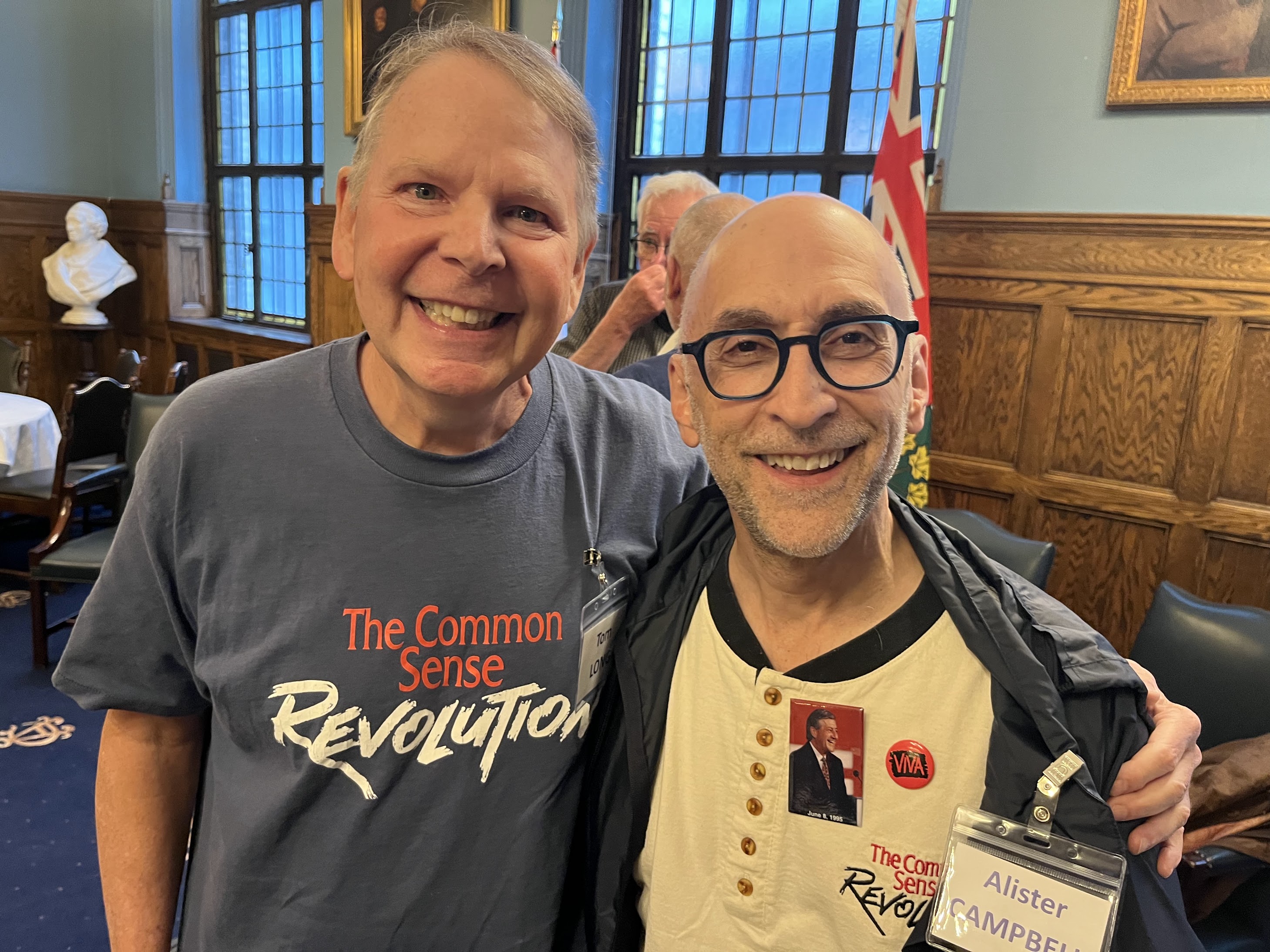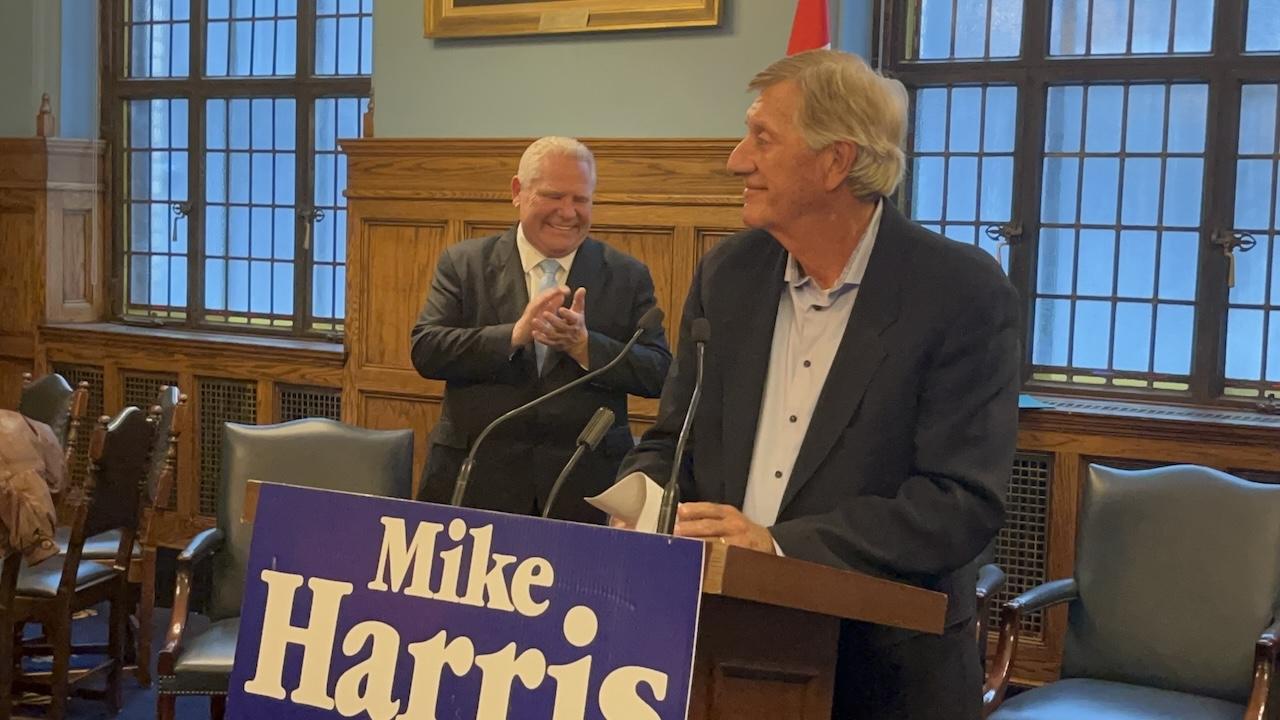It was one of the most improbable election victories in Ontario political history.
In 1990, the Progressive Conservatives chose a nine-year veteran MPP few had ever heard of to be their standard-bearer. He didn’t scare anybody. In the lead-up to the 1995 election, Mike Harris was dismissed as an unimpressive golf pro from North Bay. The smart money was on Lyn McLeod, Ontario’s first female party leader. Her Liberals had a 30-point lead over the Tories, 30 days before the election, and seemed a lock to win. A terrible recession had rendered Premier Bob Rae’s NDP out of the game.
But Harris had one thing going for him and his third-place party: a crystal-clear sense of what he wanted to do if he ever won a mandate. In 1994, after two years of traveling the province and consulting broadly with the Tory base, Harris published a manifesto called the Common Sense Revolution. And when he took it to the people in that ’95 campaign, it captured the zeitgeist. Harris took the PCs from third to first in one campaign — the first time that had happened in more than seven decades.

Tom Long and Alister Campbell were part of Harris's inner circle. (Steve Paikin)
On Sunday, 30 years to the day since their election triumph, more than 100 common sense revolutionaries gathered at the Albany Club in downtown Toronto to reminisce about that improbable victory.
“Thirty years ago, we were in the prime of our life,” said Scott Munnoch, a senior advisor in Premier Harris’s office. “Now we’re eligible to collect CPP.”
Former cabinet colleagues Janet Ecker and Tony Clement. (Steve Paikin)
After ten years of Liberal and New Democrat rule starting in 1985, the Common Sense Revolution aimed to grab Ontario by the throat and drag it back to the centre-right. The medicine would be harsh for many; even Tory supporters were skeptical of an agenda that seemed more Ronald Reagan and Margaret Thatcher than Bill Davis and John Robarts.
The plan proposed to cut income taxes by 30 per cent and welfare rates by 22 per cent. It also promised that those seeking social assistance would have to work (“a hand up, not a handout”) and drew battle lines with public sector unions as never before. Harris got rid of local councils in Metropolitan Toronto, replacing them with a single “megacity” council. He promised to cut spending and balance the books.
Premier Doug Ford called Mike Harris Ontario's "greatest" premier. (Steve Paikin)
The battle cry was simple: by the time we’re done implementing our agenda, there won’t be a single blade of grass on the lawns at Queen’s Park that will not have been trod upon by protesters. Harris wasn’t disappointed: there were plenty of boisterous protests. To this day, progressive advocates for all sorts of issues use the Harris years as a warning — a period we should never repeat.
“The reason it’s remembered all these years later is because Mike Harris, and his cabinet and caucus and staff, proceeded to do what they promised,” said Alister Campbell, part of the original inner circle. “That was the revolution.”
1995 campaign chair Tom Long embraces Leslie Noble, the campaign manager. (Steve Paikin)
You won’t be surprised to hear that the celebration brushed past the worst moments of the Harris years (as would be expected from this partisan, celebratory crowd). The Ipperwash tragedy, the Walkerton water disaster, and the sale of the tolled Highway 407 (for significantly less than it was worth) all went unmentioned.
But for all the anger the Harris government provoked, very little of the 22nd premier’s original program has been reversed. Closed local hospitals have not been reopened; standardized tests in education have not been canceled; the megacity remains intact; and no successive government has brought social assistance rates back up to their pre-Harris levels.
Dan Newman and Norm Sterling were PC cabinet ministers. (Steve Paikin)
Harris also did some things that seemed very off-brand, including historic investments in cultural organizations such as the Royal Ontario Museum and Art Gallery of Ontario. And through Lands for Life, his government was responsible for the largest expansion of parkland in the province’s history.
“Mike Harris was the greatest premier this province ever had,” said the current premier, Doug Ford. “If it wasn’t for him, I wouldn’t be standing here today.”
Paul Rhodes and Leslie Noble were original common sense revolutionaries. (Steve Paikin)
While it’s typical for successors to praise their predecessors, Ford may not be overdoing it. The premier well remembers his father, Doug Ford Sr., watching the news and railing against the NDP government of the day.
“I can’t stand politicians, and I can’t stand government,” Doug Sr. would tell his son.
“Well, you should run for office because your leader can’t either,” the premier recalls telling his dad, referring to Harris.
Helen Johns and Janet Ecker were both cabinet ministers from Exeter. (Steve Paikin)
Doug Ford Sr. became an MPP in Harris’s government.
In this way, Ford and Harris share what might be an unprecedented connection. Mike Harris’s son, Mike Jr., is in Ford’s cabinet as natural resources minister — a portfolio his father briefly held in 1985.
Fred Watson was the always good-humoured bus driver for the Harris campaign. (Steve Paikin)
“Mike Harris gave everyone in this room a lifetime of memories and friendships,” said Tom Long, the ’95 campaign chair. “You could spend a lifetime and not participate in something as meaningful and exciting as the Common Sense Revolution.”
When it was Harris’s turn to speak, he said the best decision he ever made in politics was getting Long and Leslie Noble, who didn’t know each other, and didn’t much like each other, to lead our campaign,” he said. “You two went to work, and I will be forever grateful.”
The original common sense revolutionaries gathered to celebrate the milestone. (Steve Paikin)
Harris, who turned 80 in January, began to list the dramatic changes he made in his first few weeks in office. “We cut $2 billion across government,” he began. “We cancelled the NDP’s job-killing Bill 40 [anti-scab legislation]. We killed photo radar. We got rid of the gold-plated MPP pensions…” Harris then looked at Ford and jokingly said, to enormous laughs: “Whoops.” (Last week, Ford, with the opposition’s cooperation, announced that he would restore MPP pensions.)
Jaime Watt, part of the inner circle of Harris's team. (Steve Paikin)
As with every celebration, there were inevitable moments of sadness. Many members of that class of ‘95 have died, including cabinet ministers Jim Flaherty, Al Leach, Al Palladini, and Chris Stockwell; that’s true of other MPPs, including the current premier’s father Doug Ford Sr., John Hastings, Al McLean, Julia Munro, Bill Murdoch, Peter Preston, Doug Rollins, Derwyn Shea, Frank Sheehan, and Noble Villeneuve.
And particularly distressing was the absence of one of the original members of the inner circle, John Mykytyshyn, 66, who underwent emergency open heart surgery just days before the celebration. He remains in a coma in a Hamilton hospital. Mykytyshyn called me just before going into surgery, saying how much he was looking forward to this reunion. His absence was keenly felt by many.
Meanwhile, Premier Ford gave a hint that we may not have heard the last of the Harris name.
“Mike Harris will go down in history,” Ford said. “And we’ll name a lot of infrastructure after him.”

